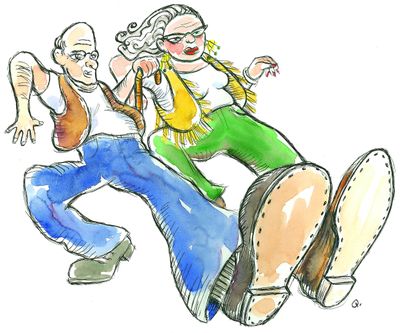Nothing really beats the term ‘baby boomers’
Renaming attempts for that infamous generation born between 1946 and 1964

Sue Hallett of Colfax was born in 1950. She doesn’t like society’s labels for people like her who are approaching 65, labels such as senior citizen or elder.
“I’m financially secure, help out with my mother and my grandchildren, volunteer in the community, swim four times a week and ski.”
Instead of a label, Hallett said: “I wish they’d call me Sue.”
Baby boomers – men and women born between 1946 and 1964 – rebelled against most things handed down to them from the generations above. So no surprise they’re rebelling against the names we use to describe older people.
In an April 5 article, we asked readers to create new names and labels for aging baby boomers who are predicted to live a lot longer than the generations before them. Many will work way past retirement age – by choice, not necessity.
Aging baby boomers have the capacity to change forever the perception of what it means to be old.
We received more than two dozen suggestions (see some of them in the fact box). And we discovered that if you ask for a simple label for a generation, you end up with lots of opinions about that generation.
The challenge
Jack Rosenthal, president emeritus of the New York Times Company Foundation, wrote an article for the New York Times in 2007 explaining that “the language has not yet caught up” with the future life of aging baby boomers.
Rosenthal, 76, is a Pulitzer Prize-winning journalist turned aging-issues specialist. He challenges groups to brainstorm names to describe what’s about to happen in society as boomers hit their late 60s and beyond.
So much will change for boomers, compared with how their parents and grandparents experienced life after 65.
Most boomers will live through a stage of life that stretches 20 to 30 years after retirement age, for instance.
“When Social Security went into effect in 1940, the typical retiree collected Social Security benefits for about two years. Now it’s more like 22 years,” Rosenthal said in a recent phone interview from his New York City home office.
But “retiree” isn’t an accurate label, because many boomers will likely work into their 70s and 80s, Rosenthal said, some at encore careers, many in part-time positions.
Even now, “the vast majority of older Americans are independent and want to remain so,” Rosenthal said. Fewer than 5 percent reside in nursing homes, for example.
Labels that describe seniors in poor health – infirmed, frail, elderly – are already outmoded for the majority of older people. And no labels yet exist that capture the sheer joy that often accompanies the older years.
Rosenthal said: “If you have some income, and most people do, and the kids are out of the house, and you have free time to do the things you want to do, why shouldn’t it be a wonderful time?”
The responses
We received naming suggestions from people of all ages. Younger-than-boomer readers suggested labels – such as the narcissists and Generation Botox – that reflect their irritation, and weariness, with all things boomer.
We also heard from folks in generations older than the boomers. Val Smith, former director of what is now Lutheran Community Services, wrote: “I laughingly told my staff … that since I was the oldest on the team, I would prefer to be called ‘respected elder.’ They laughingly acceded. We were establishing a foster care program for Native American foster children and invited the respected elders from many tribes to educate us on how we could do this in a respectful, careful and successful way.
“They came, we lit a pipe, prayed to the higher spirits, and began to talk and listen to one another. I still thank the respected elders in my heart for what they accomplished. And I hope I can earn my way to that title. I will be 74 this month.”
Some boomers recycled old labels in creative ways.
John Glesk of Nine Mile Falls suggested “New Agers” because boomers were part of the Age of Aquarius and “we qualify as new agers because (aging) hasn’t happened before this way in society.”
Some were humorous.
An anonymous emailer suggested “prosthetic hippies.”
Jeff Brown of Spokane Valley wrote: “We’re fine. We don’t need a label. We’ll travel to Arizona in the winter, wear our khakis up under our armpits, leave our left turn signal on from Spokane to Seattle, eat dinner at the Golden Corral at 4 p.m. We’ll fill our grandchildren full of processed sugar and send them home. Oh, and get off my lawn.”
Some voted for the obvious. “How about people?” one blog commenter asked. Another suggested “aging baby boomers.”
Fran Makarczyk of Spokane added flair to the commonplace. She suggested: “Bigger, better, badder boomers.”
The “winner”
When companies can’t find the perfect employee for a coveted job, they call it a failed search.
Though we received many great descriptions, none struck us as just right.
Rosenthal wasn’t surprised at our failed search. He thinks the labels that emerge will be descriptive, but not catchy.
He said, “My best guess – and it’s not very poetic – is that we’ll talk about the ‘young-old’ – those 65 to 80. The ‘old-old’ will be 80 to 90. The ‘oldest-old’ will be 90 to 99. The centenarians, of course, would be over 100.
“It’s interim language and very likely the answer to this problem is there is no answer.”
He’s OK with that, though he continues to issue his name-game challenge, likely to instigate discussions like this.
“You are talking about 50 million people of both sexes, of various ethnic groups, a variety of ages, occupations, intelligence, health and geography,” he said. “It’s insane to generalize.”